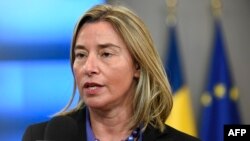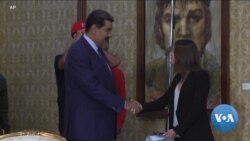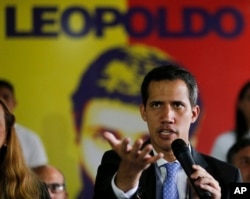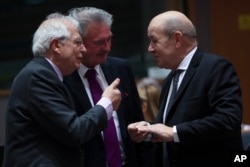Pressure is growing on the European Union to formally back Venezuela's opposition, after three EU lawmakers were refused entry into the country Sunday.
The Venezuelan government accused them of having "conspiratorial aims," and forced them back on a plane to Madrid. The three had been invited by Venezuelan members of parliament to visit the country.
"[It was] very unpleasant and a pure demonstration that Venezuela is a country held hostage by a power that is almost like North Korea," Esteban Gonzalez Pons, a senior member of the European Parliament, told reporters on his arrival in Madrid Monday.
WATCH: Europe pushed to make a decision on Venezuela
The diplomatic snub has triggered calls for Brussels to take a stronger stand against the government of disputed President Nicholas Maduro. The United States and many allies have recognized opposition leader Juan Guaido as interim president, after accusations of vote rigging in last year's election.
The EU lawmakers have demanded that the bloc now abandon the International Contact Group or ICG, an EU initiative among European states and four Latin American countries, that is seeking a political way forward in Venezuela. The group met in the Uruguayan capital, Montevideo, earlier this month.
Europe's foreign policy chief rejected pulling out of the ICG Monday.
"On the contrary, all member states have reaffirmed how crucial it is to have this instrument, which is currently probably the only one that we can use, to be at the same time in contact with relevant stakeholders and clear on the objective, which is a democratic, peaceful, and early election outcome for the crisis," Federica Mogherini said in a press conference.
At the Munich Security Conference Saturday, U.S. Vice President Mike Pence said the European Union must recognize the American-backed interim president.
The Netherlands was among the EU member states that followed Washington's lead. Foreign Minister Stef Blok spoke to VOA following Pence's speech.
"Twenty-two European countries did recognize Guaido as the interim president. And of course I would have preferred to see the European Union united," Blok said.
The EU, however, is divided. Spain, which retains the closest links to its former colony, rejected Washington's demands.
"Mr. Pence can't ask us to not accept the constitutional law of Venezuela," Spain's foreign minister, Josep Borrell, said at the Munich conference.
Borrell's French counterpart, Jean-Yves Le Drain, is insisting on new elections.
"The only way out of the political crisis in Venezuela is a presidential election with democratic guarantees," Le Drian said.
The Dutch government has agreed that its overseas territory of Curacao, an island off Venezuela, can be used as an aid hub.
"In order to get the aid toward Venezuela, we will need the consent of the Venezuelan authorities," Blok told VOA.
As the diplomatic debate intensifies over how to end Venezuela's political crisis, hundreds of tons of foreign aid remain stranded on the country's borders — and the Venezuelan people continue to suffer.








